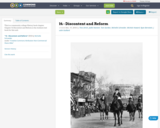
This is a community college History book chapter. Chapter 14 Discontent and Reform is the students text book for this unit.


This is a community college History book chapter. Chapter 14 Discontent and Reform is the students text book for this unit.
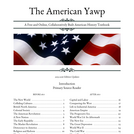
The American Yawp constructs a coherent and accessible narrative from all the best of recent historical scholarship. Without losing sight of politics and power, it incorporates transnational perspectives, integrates diverse voices, recovers narratives of resistance, and explores the complex process of cultural creation. It looks for America in crowded slave cabins, bustling markets, congested tenements, and marbled halls. It navigates between maternity wards, prisons, streets, bars, and boardrooms. Whitman’s America, like ours, cut across the narrow boundaries that strangle many narratives. Balancing academic rigor with popular readability, The American Yawp offers a multi-layered, democratic alternative to the American past.

Online OER text created for U.S. History 1865 to Present by Dr. June Klees for Bay College.
© 2017 Bay College and Content Creators. Except where otherwise noted this work is licensed under the Creative Commons Attribution 4.0 International License. To view a copy of this license, visit http://creativecommons.org/licenses/by/4.0/.
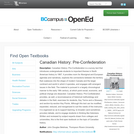
Canadian History: Pre-Confederation is a survey text that introduces undergraduate students to important themes in North American history to 1867. It provides room for Aboriginal and European agendas and narratives, explores the connections between the territory that coalesces into the shape of modern Canada and the larger continent and world in which it operates, and engages with emergent issues in the field. The material is pursued in a largely chronological manner to the early 19th century, at which point social, economic, and political change are dissected. Canadian History: Pre-Confederation provides, as well, a reconnaissance of historical methodology and debates in the field, exercises for students, Key Terms and a Glossary, and section-by-section Key Points. Although this text can be modified, expanded, reduced, and reorganized to suit the needs of the instructor, it is organized so as to support learning, to broaden (and sometimes provoke) debate, and to engage students in thinking like historians. Written and reviewed by subject experts drawn from colleges and universities, this is the first open textbook on the topic of Canadian history.
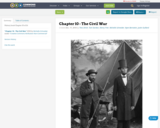
History book Chapter 10 of 26
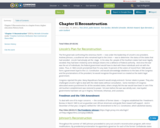
Chapter 11 Reconstruction is a chapter from a higher education History book.
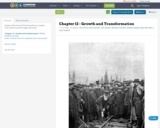
Chapter 12 Growth and Transformation is a chapter from a history book for higher education.
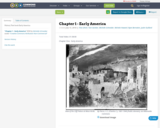
History Text book Early America
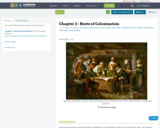
History Text Book Chapter 2 Roots of Colonization
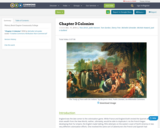
History Book Chapter Community College
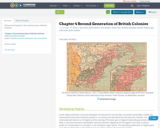
History book Chapter 4, Second Generation of British Colonies
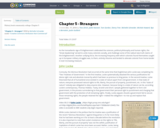
History book community college. Chapter 5
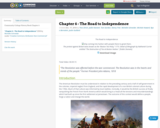
Community College History Book Chapter 6
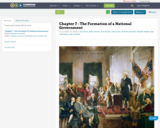
Community College History book
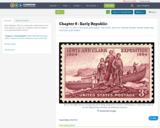
Early Repbulic. This is a community college history text book chapter. It is part of a complete series of chapters covering United States Hisory
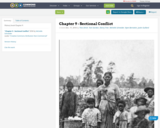
History book Chapter 9.
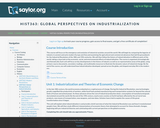
This course will focus on the emergence and evolution of industrial societies around the world. The student will begin by comparing the legacies of industry in ancient and early modern Europe and Asia and examining the agricultural and commercial advances that laid the groundwork for the Industrial Revolution. The student will then follow the history of industrialization in different parts of the world, taking a close look at the economic, social, and environmental effects of industrialization. This course ultimately examines how industrialization developed, spread across the globe, and shaped everyday life in the modern era. Upon successful completion of this course, students will be able to: identify key ideas and events in the history of industrialization; identify connections between the development of capitalism and the development of modern industry; use analytical tools to evaluate the factors contributing to industrial change in different societies; identify the consequences of industrialization in the 19th and 20th centuries in different societies; critique historical interpretations of the causes and effects of industrialization; and analyze and interpret primary source documents describing the process of industrialization and life in industrial societies. (History 363)

U.S. History is designed to meet the scope and sequence requirements of most introductory courses. The text provides a balanced approach to U.S. history, considering the people, events, and ideas that have shaped the United States from both the top down (politics, economics, diplomacy) and bottom up (eyewitness accounts, lived experience). U.S. History covers key forces that form the American experience, with particular attention to issues of race, class, and gender.
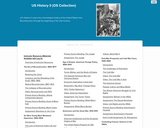
U.S. History II covers the chronological history of the United States from Reconstruction through the beginning of the 21st Century.
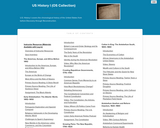
U.S. History I covers the chronological history of the United States from before Discovery through Reconstruction.